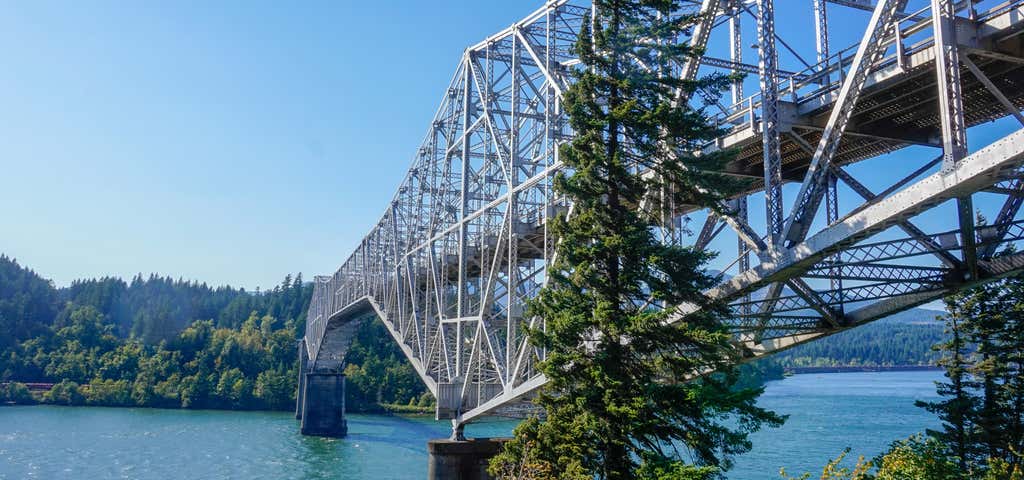Written by Marguerite Cleveland
The Columbia River Gorge National Scenic Area is so gorgeous that in 1986, Congress passed a bill to protect it, making it the second expanse to be designated as a U.S. National Scenic Area (eastern California’s Mono Basin was the first). The Columbia River flows through the gorge between Washington and Oregon and features lush forests, waterfalls, and high desert terrain. Come for the stunning scenery but stay long enough to explore the area’s museums, bridges, and wineries, plus a replica of Stonehenge dedicated to Washington veterans of World War I.
The epic, mile-long hike to the top of Beacon Rock provides the best views of the Columbia River Gorge on the Washington side. Despite the 848-foot change in elevation, this is the perfect beginner hike, comprising 52 gradual switchbacks—worth it for the stunning views from the top. Lewis and Clark gave Beacon Rock its name after camping here on their journey to the Pacific in 1805 and on their return trip a year later. The Doetsch Day Use Area has picnic tables and a 1-mile, ADA-accessible, interpretive trail.
1
Bonneville Dam Wa Shore Visitor Ctr
The Bonneville Dam is a National Historic Landmark and a fascinating place to visit. Start at the Visitor Orientation Building to see exhibits on electricity and the region’s hydroelectric dams, and to view the generators from 85 feet above the powerhouse floor. Tours of the powerhouse are offered daily on a first-come, first-served basis. The Fish Viewing Building features interpretive exhibits about the importance of salmon. Don’t miss the fish ladder, which allows fish to swim upstream and bypass the dam. During the salmon run, volunteers count the fish as they pass by the large windows.
2
Fort Cascades Historic Site
The Fort Cascades National Historic Site is located next to the Bonneville Dam. Pick up a brochure for a self-guided, 1.5-mile loop hike at the trailhead. Interpretive signs and larger items found during archaeological excavations are displayed along the hike. The best place to take photos of the dam is from the Wauna Point and Wauna Viewpoint.
The Bridge of the Gods spans the Columbia River and connects Washington to Oregon. It’s believed that a natural stone arch bridge once existed where the current bridge stands; when it collapsed, it created the Cascade rapids. According to Native American legend, the natural bridge was created and destroyed over time by the gods, hence the dramatic name. The bridge is part of the Pacific Crest Trail, which extends from the Mexican border all the way to Canada, and gained fame from Cheryl Strayed’s memoir, Wild: From Lost to Found on the Pacific Crest Trail, and its movie adaptation starring Reese Witherspoon. Next to the bridge (on the Washington side), an area open to pedestrians and vehicles provides great views of the Columbia River.
4
Columbia Gorge Interpretive Center Museum
The Columbia Gorge Interpretive Center is filled with artifacts showcasing the natural and human history of the area. The multi-story building contains a waterfall, a fish wheel replica, a 1921 Mack truck loaded with cedar logs, a Corliss steam engine (operated upon request), and the Don Brown Rosary Collection. Housed in the Spiritual Quest Gallery at the top of the museum is the world’s largest collection of rosaries (more than 4,000), which includes ones once used by John F. Kennedy, Lawrence Welk, and Boys Town founder Father Flanagan.
The Skamania Lodge was designed to evoke classic national park lodges such as the Old Faithful Inn in Yellowstone National Park. With jaw-dropping views of the Columbia River Gorge, an expansive lawn with Adirondack chairs and lawn games, and a firepit (the gift shop sells s’mores kits), this full-service resort also has restaurants, a bar, a spa, and a variety of outdoor activities, including ziplining and axe throwing.
6
Maryhill Winery
The Maryhill Winery is perched on a bluff overlooking the Columbia River, with views of Mount Hood and row upon row of vines. One of Washington’s largest wineries, Maryhill produces more than 80,000 cases a year. On weekends in the summer, enjoy live music on the terrace while sipping a selection from a large variety of classic and reserve wines. The restaurant offers charcuterie, small shareable plates, pizza, and salads. Explore the grounds or enjoy a game of bocce on a tournament-quality court at this family-friendly destination winery.
Open daily from March 15 to November 15, the Maryhill Museum of Art is one of the most fascinating museums in the Pacific Northwest. When it opened in 1940, Time Magazine called it “the world’s most isolated art museum.” Housed in a historic Beaux Arts mansion built by Sam Hill, an eccentric Renaissance man, the 5,300-acre estate overlooks the Columbia River Gorge. Queen Maria of Romania presided over the dedication ceremony and donated more than 100 works of art and personal items to the museum. Hill’s friend Loie Fuller, a modern dancer living in Paris, helped him acquire more than 80 works by French sculptor Auguste Rodin. The grounds include the William and Catherine Dickson Sculpture Park, the Lewis and Clark Overlook, a gift shop, and a cafe.
Maryhill Stonehenge
Three miles east of the museum is the first World War I memorial in the U.S.: a replica of Stonehenge built by Sam Hill and dedicated in 1918 to honor the war casualties from Klickitat County, Washington. Hill thought the ancient Neolithic structure in England was a place of human sacrifice and drew a parallel between the dead of WWI and Stonehenge. He consulted the leading experts of his day in archaeology, astronomy, and engineering to recreate the design and size of the original site. The full-scale replica sits high on a bluff overlooking the Columbia River Gorge, with magnificent views of the Columbia River and Mount Hood. After Hill died in 1931, his ashes were placed in a crypt near his Stonehenge. His epitaph reads: “Samuel Hill: Amid nature’s great unrest, he sought rest.”
Banner Photo Credit: Sanna Boman (Roadtrippers)
Roadtrippers
Roadtrippers helps you find the most epic destinations and detours—from roadside attractions to natural wonders and beyond.
Explore More Trip Guides
A Highway 1 road trip along California’s Central Coast
- 14 Places
- 02:49
- 99 mi
Route 66 Leg 2: St. Louis to Tulsa
- 61 Places
- 18:31
- 876 mi
Route 66 Leg 1: Chicago to St. Louis
- 71 Places
- 16:31
- 636 mi
Route 66 Leg 3: Tulsa to Amarillo
- 94 Places
- 18:36
- 867 mi











